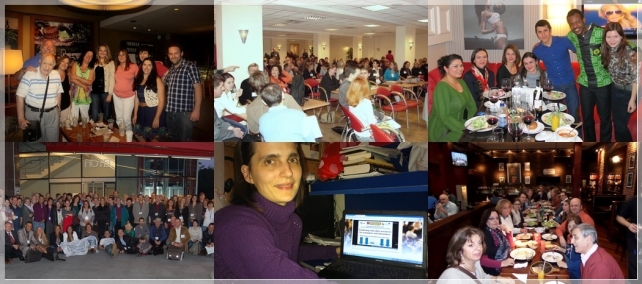Anastasia Kozhukhova is an English to Russian language professional specializing in legal and marketing texts as well as website localization. In addition to being a successful freelance translator, Anastasia is also a ProZ.com professional trainer, sharing insight that she’s gained throughout her career with the community. In today’s guest post, Anastasia shares some tips on how to effectively communicate with clients.
“A good business letter can get you a job interview, get you off the hook, or get you money. It’s totally asinine to blow your chances of getting whatever you want with a business letter that turns people off instead of turning them on.”
Malcolm Forbes
 For the last three months I have been thoroughly studying the issue of communication with clients from the point of view of translation business and discovered a paradox – though Translators usually make their translations in a clear and concise manner (at least, they are expected to), very often their business writing and communication with the clients lacks this persuasiveness and conciseness. As a result, many Translators do not get the results they want when cooperating with their customers.
For the last three months I have been thoroughly studying the issue of communication with clients from the point of view of translation business and discovered a paradox – though Translators usually make their translations in a clear and concise manner (at least, they are expected to), very often their business writing and communication with the clients lacks this persuasiveness and conciseness. As a result, many Translators do not get the results they want when cooperating with their customers.
Being Language Specialists, we must understand that each email we write is a snapshot of our writing skills. Without well-written communication it is unlikely a Translator will achieve success in the translation business on the whole. The thing is that many Translators do not know the difference between usual writing and business communication. Meanwhile, good business writing implies more than simply following the rules of Grammar. In today’s age of digital job hunting and endless online searches, email communication implies:
-
Expressing your ideas in a clear manner so that you reach your objective in each email (reach the client you want to cooperate with or win the project you want to translate);
-
Impressing your clients so that they hear your voice among the noise of hundreds of other applicants;
-
Understanding your target audience perfectly (you should know who is going to read your email).
On the whole, business communication experts describe business writing as follows:
-
Conversational but not too chatty;
-
Crystal clear, but not too simplistic;
-
Professional and polite, but not too formal
-
Action-oriented (it should encourage the reader to take specific actions)
However, it is not that easy to use these principles in practice and many freelancers keep on making the same mistakes when writing cover letters to their prospective clients. The most common of them are as follows:
-
Using ready-made templates from the Internet (When applying to a job post many Translators use cut-and-paste emails for every application. However, using one and the same template for all of your clients will never increase the number of your projects.)
-
Not mentioning the name of the Recipient (emails starting with Dear Sir/Madam)
-
Talking only about yourself, your skills and experience without linking these points with the client’s needs
-
Writing too long emails with long paragraphs without highlighting any key words (causing problems for Hiring Managers who tend to scan emails instead of reading them thoroughly)
-
Making dull endings without call to action (e.g. Thank you for your time. Please feel free to contact me at xxx@mail.com.)
-
Lack of proofreading which results in typos and lazy writing (e.g. pls, thanks) which is unacceptable in business communication
Today I will tell about one aspect which I consider to be one of the most important ones in communication with clients when you just start cooperating with them and want to prove that you deserve being their reliable partner when it concerns supply of translation services.
This aspect is about being READER-FOCUSED in each email you send to your customers. I am sure that you have already heard and read a lot about focusing on your client. But how can we achieve this in practice? This remains a confusing question for many freelancers.
This is true that people like reading only about themselves and their problems. They are not interested to know about your professional experience and skills even if the latter are really outstanding. The clients only want to know how you can solve their problems and make their life easier. To achieve this and motivate the prospective clients to read your emails, I suggest focusing on using You/Your pronouns instead of I/My in each email you send. Below you will find some examples of how in one and the same idea we can shift the focus from ourselves and our achievements to the customer’s needs and problems.
So, please compare:
-
Responding to a job post on ProZ.com (beginning of the cover letter):
|
Wrong: Dear Tom, I am writing to apply for the position of a Freelance Translator published today on ProZ.com. Let me introduce myself. My name is XXX. I am English to Italian Translator with 10 years of experience and excellent language skills. Since 2006 I have cooperated with many companies… |
Right: Dear Mr. Smith, I am contacting you concerning your job posting at Proz.com. As I understand, you are looking for an EN-IT Translator to translate your marketing brochure in a compelling manner by March 14th… |
As you see, in the first sample the Translator applying to a job post focuses only on himself and does not make an attempt to link his skills with the requirements of the company mentioned in the advertisement. In the second sample the Translator does his best to emphasize that first of all he carefully read the job post and understood the customer’s problem and main requirements.
-
Asking the customer for further details of cooperation:
|
Please let me know your time zone so that I take it into account for my convenience |
Please let me know your time zone, so that you can receive translations from me at the time convenient for you. |
From these samples you can see how you can shift the focus to your customer even when asking such simple and routine questions like these. Please mind the usage of pronouns I and You in these samples.
-
And one more example – Sending an update informing your customer about the new services you can provide):
| I am pleased to inform you that now I have built my team consisting of Professional Translators, Editors and a Designer and that we are open and ready to accept larger projects and provide translations in a timely manner. | Your projects will be turned around more quickly and you will enjoy a higher degree of accuracy than was previously available, because I have built my own team of Professional Translators, Editors and Designers which is now ready to work for your business. |
So, now you see how powerful the usage of pronouns and shifting the focus to the customer can be in business communication with both your prospective and recent clients.
Start applying these easy-to-use principles in your daily business communication and see how quickly your results and effectiveness will increase and how many new projects you will get!
If you are interested in making your email communication even more effective (especially with your prospective customers), you are welcome to attend my Webinar on ProZ.com which will take place on July 28 and which is called “Effective Email Communication with the Customer for a Translator”.
During this Webinar you will receive many more examples of making your business writing reader-focused and learn how to provide solutions to the customers’ problems so that they choose YOU as their translation services partner. You will also find useful tips on how to effectively communicate with the customer in other situations:
– when submitting a quote via ProZ
– sending your CV to a prospective direct client
– accepting or rejecting a job offer
– sending an update on your skills and services, so that to keep your customers engaged.
I will be glad to see all of you on July 28th and wish you good luck in improving your business writing right after reading this article!
Thanks to Anastasia for sharing this information with us!
There are still a few more seats available for tomorrow’s training session, which will elaborate on some of the communication strategies touched on in this post. To register, please visit: http://www.proz.com/translator-training/course/12214-effective_email_communication_with_the_customer_for_a_translator
Be sure to check out upcoming training sessions and on-demand videos offered by Anastasia – covering topics ranging from CV writing to finding high-end clients – here: http://www.proz.com/translator-training/trainers/1234/courses
I hope you enjoyed this guest post. As always, comments, feedback, and suggestions for future topics can be submitted below or via Twitter @ProZcom

